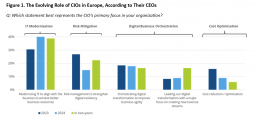In the digital business and AI-everywhere era, technology is now a strategic enabler that permeates every aspect of business operations. According to IDC’s Worldwide CEO Survey (February 2024, n = 67), 48% of CEOs in Europe, the Middle East, and Africa (EMEA) now report regularly to the board on the status of digital initiatives, highlighting the strategic nature of digital technologies among businesses.
In this context, the chief information officer (CIO) is assuming a pivotal role as business leader, with digital technologies driving innovation, growth, and competitive advantage. Increasingly, the main KPIs on which CIOs are now measured are business-related metrics, from revenue growth to improving customer and employee experience, in a close relationship with other functional business leaders.
Historically, the CIO was primarily responsible for managing the IT infrastructure, ensuring its reliability, security, and efficiency. However, in today’s digital business era, European CEOs are assigning their CIOs multiple responsibilities, each one building upon the other to an increasing level of complexity:
- IT Modernization: This will be the primary responsibility for CIOs for the next two years, with the aim of making IT systems and solutions up to date and capable of providing the necessary speed, efficiency, and flexibility to improve business results. The expansion of artificial intelligence and generative AI — and the drive to generate value from these technologies — is drawing attention to the fundamental aspects of foundational IT. Modernizing IT systems and processes also requires significant organizational change, addressing concerns and resistance from stakeholders and ensuring a smooth transition to new systems and technologies. This involves training and support for employees to help them adapt to new ways of working, which requires collaboration from other C-suite roles.
- Digital Business Orchestration: In the next two years, as organizations mature into digital businesses, CIOs will be increasingly expected to orchestrate digital business initiatives across different functions, with a view to generating new revenue streams from digital business models, such as ecommerce or servitization. While C-Suite buy-in and stakeholder management are key for this progress, they will be even more essential for IT modernization. For instance, in the majority of organizations, investment decisions around artificial intelligence entail joint accountability. IDC predicts that in 2024, as part of a responsible Al strategy, 40% of CIOs in EMEA organizations adopting Al will team up with line-of-business CxOs to ensure a clear ROI on prioritized use cases (IDC EMEA Futurescape, 2024).
- Risk Mitigation and Management: Macro-shocks such as the Covid-19 pandemic, geopolitical and economic uncertainties, and supply chain disruptions have underlined the need for digital technologies to strengthen overall organizational resiliency. CIOs are tasked with ensuring business continuity and defining disaster recovery plans in the face of risks ranging from cyber attacks to unpredictable external events. Investing in security technologies to improve organizational risk posture is first priority for European CEOs and CIOs. Moreover, attention to regulatory compliance and corporate trust is on the rise, as reflected in the European Union, for example, with directives such as the Corporate Sustainability Reporting Directive (CSRD). Technology can play a key role in such areas as integrating and automating environmental, social, and governance (ESG) compliance reporting. This is why IDC also predicts that, by 2025, CIOs in at least 60% of large EMEA organizations will have components of their compensation package tied to ESG targets.
- Cost Optimization: Despite persisting macroeconomic uncertainties, European CEOs do not expect to reduce IT budgets, as digital investments are key to driving business growth. In fact, according to IDC Worldwide Black Book Live Edition (March 2023), IT spending in EMEA will grow four times faster than GDP in 2024. However, with the number of digital initiatives increasing steadily and IT modernization efforts requiring significant financial investments, CIOs are in charge of resource allocation and are often being accountable for cost control when orchestrating digital business initiatives across functions.
As the role of CIOs expands to encompass broader strategic responsibilities, these leaders are increasingly claiming their seat on the Board as digital business leaders.
To learn more about IDC EMEA CIO Predictions, download our ebook IDC FutureScape “What If You Could See Around the Corner — EMEA Perspective” or reach out to discover more on IDC EMEA C-Suite Tech Research.


